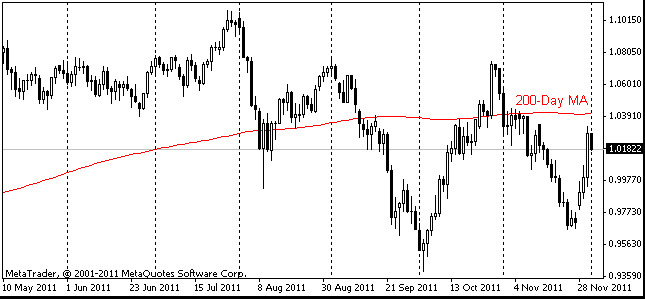EUR/usd
The single currency managed to save its face by closing the previous week above 1.30. For all that there was no sign of any significant progress in handling the crisis in Europe. What we see at the moment looks like a technical rebound rather than a movement on expectations of recovery. Thursday and Friday were marked by little growth on the pair, which must have allowed bears to get ready for mounting an attack this pre-Christmas week. U.S. price data have confirmed the tendencies of recent months. The headline CPI is slowing down on oil and energy disinflation, demonstrating a 3.4% increase y/y in November against 3.5% y/y a month earlier and the 3.9% peak in September. The core index is showing steady growth, having already reached 2.2%. This is the highest level since 2008.On the other hand, current levels are typical of the pre-crisis period, taking into account the fact that on the price front the situation appears to be relatively healthy at the moment. A warm spell has set in the labour market, the real estate market has stabilized and companies' investments are growing. By contrast, in Europe manufacturing orders are becoming fewer, production is contracting and trade surplus is shrinking. Yet 1.30 is undoubtedly very expensive for the euro for several years to come. However, the political situation in the U.S. may prevent the dollar from rising. An unpleasant trend has shown up this year: the politicians may seriously hamper the economy. A couple of years ago they dealt with the majority of issues in the right way, but for some reason now they seem to have lost the skill.

GBP/USD
Bank of England has issued a Quarterly Bulletin, where it records a slow recovery resulting from the fall in consumer activity. We actually see the reason for such behavior in the extremely high household debt burden of the country. Consumers have so far kept and over the next several years will probably keep a low activity especially in regard to house purchases and loans. The situation with housing demand is also clear from Rightmove HPI report. According to it, housing prices have been reduced by 2.7 % in December, following a 3.1% cut in November and a 2.7% rise in October. But it should be mentioned here that this tendency is absolutely similar to that of the previous year. The market tries to balance between the drop in demand on rising prices and the reduction of supply on falling prices. On the whole the year-end inflation of housing prices is lower than the overall growth of CPI (+1.5% for the former vs. 4.7% for the latter). Due to deleveraging the British real estate market can no longer be the driver of the economy and consumer demand cannot take the place either. The only thing left is a hope for export, which has improved the situation in a way at the end of the year, but is still too far from becoming a driving force.

USD/JPY
The previous week ended with almost zero results for the Japanese yen: the pair closed at 77.75 against the opening level of 77.67. Yet it should be mentioned that the dollar/yen is now attracting buyers' interest above the level of 78, from which it was thrown back last week and at the beginning of trades this week. But at the same time we can observe a succession of rising lows on the usdjpy charts. All this promises a fierce struggle for the 78 level over the last weeks of the outgoing year as well as at the beginning of the next year. The outcome of this struggle may have a significant impact on the trend of 2012. As before, we believe that the dollar has the potential to swing about the current trend, entering a continuous phase of growth against the yen.

AUD/USD
The aussie bulls' attempt to push the currency above parity failed. Bulls gave up on Friday, though on Thursday they still had had enough strength to move the pair against the general market trend. Today, with the start of trading in Asia, the Aussie again has fallen under downward pressure and is now trading at 0.9930. Some analysts attribute the pressure on the Australian and New Zealand currency to the news about the death of North Korea's leader, Kim Jong-il. In theory, this may destabilize the situation in the region as the youngest of the leader's three sons, Kim Jong Eun, has been appointed as his successor. The situation may be hampered due to the struggle for power between young Kim and the country's generals. On such news South Korea immediately raised its combat readiness and the president convened the Security Council. The Japanese PM also convoked the Cabinet to discuss the situation. But this anxiety is likely to be vain as the young president is generally known for his liberalism which many believe to be a result of his Swiss education.
